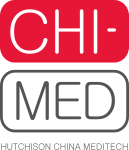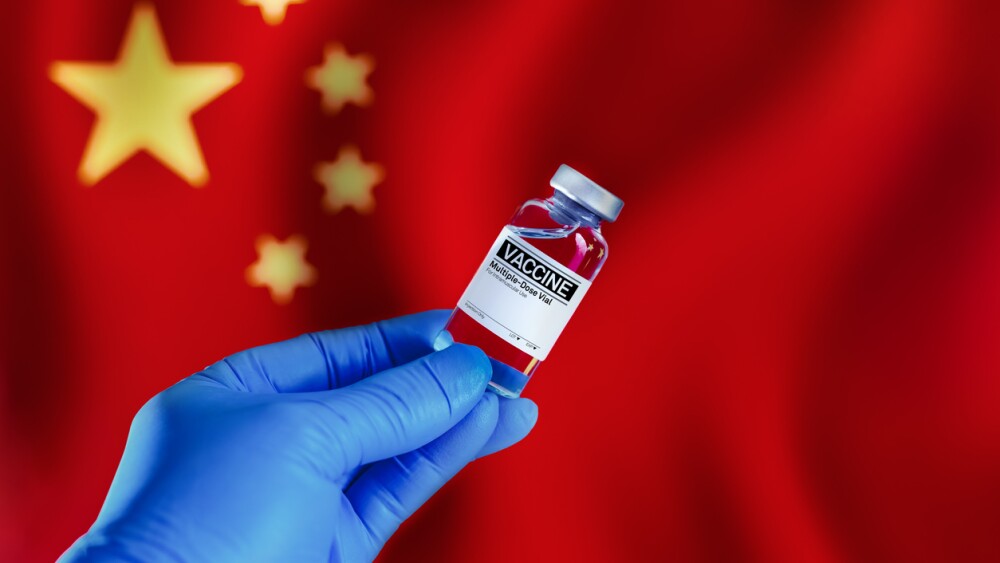– Company plans to complete rolling submission in the first half of 2021 – – The pivotal Phase III SANET-ep trial demonstrated surufatinib reduced risk of progression or death by 67%, extending PFS of non-pancreatic NET patients with an acceptable risk/benefit ratio – – The pivotal Phase III SANET-p trial demonstrated surufatinib reduced risk of progression or death by 51%, extending PFS of pancreatic NET patients with an acceptable risk/benefit ratio – – First NDA submission by Ch
– Company plans to complete rolling submission in the first half of 2021 –
– The pivotal Phase III SANET-ep trial demonstrated surufatinib reduced risk of progression or death by 67%, extending PFS of non-pancreatic NET patients with an acceptable risk/benefit ratio –
– The pivotal Phase III SANET-p trial demonstrated surufatinib reduced risk of progression or death by 51%, extending PFS of pancreatic NET patients with an acceptable risk/benefit ratio –
– First NDA submission by Chi-Med in the United States –
HONG KONG, SHANGHAI, China and FLORHAM PARK, N.J., Dec. 28, 2020 (GLOBE NEWSWIRE) -- Hutchison China MediTech (Chi-Med) (Nasdaq/AIM: HCM) today announces that it has initiated the filing of a New Drug Application (“NDA”) to the U.S. Food and Drug Administration (“FDA”) – the first portion of a rolling submission for surufatinib for the treatment of pancreatic and non-pancreatic neuroendocrine tumors (“NET”). Chi-Med plans to complete the NDA submission in the first half of 2021, which would be the company’s first NDA in the U.S.
The Fast Track Designation granted earlier this year by the FDA permits the company to submit sections of the NDA on a rolling basis. The NDA is supported by data from the two positive Phase III studies of surufatinib in NET in China, along with data from surufatinib studies in U.S. non-pancreatic and pancreatic NET patients. The company previously announced that it had reached an agreement with the FDA during a pre-NDA meeting, whereby these studies may serve as the basis to support an NDA submission. Filing acceptance of the NDA is subject to FDA review of the complete application. The data package will also be used to file a Marketing Authorization Application (“MAA”) to the European Medicines Agency (“EMA”) in 2021, based on scientific advice from the EMA’s Committee for Medicinal Products for Human Use (CHMP).
Marek Kania, M.D., Managing Director and Chief Medical Officer of Hutchison MediPharma International, said, “With the initiation of our first regulatory filing in the U.S., we are executing our strategy of building a global pharmaceutical company that brings innovative cancer therapies to patients worldwide. There is a great need for additional therapies to treat neuroendocrine tumors, and surufatinib has demonstrated significant clinical benefit in patients with advanced tumors. The NDA filing to the U.S. FDA represents a significant step toward our goal of commercializing surufatinib and other novel therapies globally.”
The company plans to initiate an Expanded Access Protocol to ensure patients with limited therapeutic options have access to this important treatment. Enrollment into this early access program is anticipated to begin in the first quarter of 2021, once regulatory clearance of the protocol has been granted by the FDA.
The FDA granted two Fast Track Designations to surufatinib for development in pancreatic and non-pancreatic (extra-pancreatic) NET in April 2020 and Orphan Drug Designation for pancreatic NET in November 2019.
About NET
NET form in cells that interact with the nervous system or in glands that produce hormones. They can originate in various parts of the body, most often in the gut or the lungs and can be benign or malignant. NET are typically classified as pancreatic NET or non-pancreatic NET. Approved targeted therapies include Sutent® and Afinitor® for pancreatic NET, or well-differentiated, non-functional gastrointestinal or lung NET.
According to Frost and Sullivan, there were 19,000 newly diagnosed cases of NET in the U.S. in 2018. Importantly, NET are associated with a relatively long duration of survival compared to other tumors. As a result, there were approximately 141,000 estimated patients living with NET in the U.S. in 2018.1
About Surufatinib
Surufatinib is a novel, oral angio-immuno kinase inhibitor that selectively inhibits the tyrosine kinase activity associated with vascular endothelial growth factor receptor (VEGFR) and fibroblast growth factor receptor (FGFR), which both inhibit angiogenesis, and colony stimulating factor-1 receptor (CSF-1R), which regulates tumor-associated macrophages, promoting the body’s immune response against tumor cells. Its unique dual mechanism of action may be very suitable for possible combinations with other immunotherapies, where there may be synergistic anti-tumor effects.
Chi-Med currently retains all rights to surufatinib worldwide.
About Surufatinib Development
NET in the U.S., Europe and Japan: In the U.S., surufatinib was granted Fast Track Designations for development in pancreatic and non-pancreatic (extra-pancreatic) NET in April 2020 and Orphan Drug Designation for pancreatic NET in November 2019. A U.S. FDA NDA submission was initiated in December 2020, to be followed by a MAA submission to the EMA in Europe. The basis to support these filings includes the completed SANET-ep and SANET-p2 studies, along with existing data from surufatinib in U.S. non-pancreatic and pancreatic NET patients (clinicaltrials.gov identifier: NCT02549937).
Non-pancreatic NET in China: In November 2019, a NDA for surufatinib for the treatment of patients with advanced non-pancreatic NET was accepted for review by the National Medical Products Administration of China (“NMPA”) and granted Priority Review status in December 2019. The NDA is supported by data from the successful SANET-ep3 study, a Phase III trial (clinicaltrials.gov identifier: NCT02588170) in patients with advanced non-pancreatic NETs conducted in China. The study had met the pre-defined primary endpoint of progression-free survival (“PFS”) at a preplanned interim analysis. The positive results of this trial were highlighted in an oral presentation at the 2019 ESMO Congress and published in TheLancet Oncology in September 2020.4 SANET-ep demonstrated that surufatinib reduces risk of progression or death by 67%, with median PFS significantly longer for patients treated with surufatinib at 9.2 months, compared to 3.8 months for patients in the placebo group (HR 0.334; 95% CI: 0.223-0.499; p<0.0001). Surufatinib had an acceptable risk/benefit ratio.
Pancreatic NET in China: In 2016, we initiated the SANET-p study, which is a pivotal Phase III study in patients with low- or intermediate-grade, advanced pancreatic NET in China. It was terminated early as the pre-defined primary endpoint of PFS was met (clinicaltrials.gov identifier: NCT02589821) at a preplanned interim analysis, leading to a second NDA accepted by the China NMPA in September 2020. The positive results of this study were presented at the 2020 ESMO Virtual Congress and published simultaneously in The Lancet Oncology5, demonstrating that surufatinib reduces the risk of disease progression or death by 51% in patients, with median PFS of 10.9 months compared to 3.7 months on placebo (HR 0.491; 95% CI: 0.391-0.755; p=0.0011). The safety profile of surufatinib was manageable and consistent with observations in prior studies.
Biliary tract cancer in China: In March 2019, we initiated a Phase IIb/III study comparing surufatinib with capecitabine in patients with advanced biliary tract cancer whose disease progressed on first-line chemotherapy. The primary endpoint is overall survival (OS) (clinicaltrials.gov identifier: NCT03873532).
Immunotherapy combinations: We have entered into collaboration agreements to evaluate the safety, tolerability and efficacy of surufatinib in combination with anti-PD-1 monoclonal antibodies, including with tislelizumab (BGB-A317), Tuoyi® (toripalimab) and Tyvyt® (sintilimab), which are approved as monotherapies in China.
About Chi-Med
Chi-Med (Nasdaq/AIM: HCM) is an innovative, commercial-stage, biopharmaceutical company committed, over the past twenty years, to the discovery and global development of targeted therapies and immunotherapies for the treatment of cancer and immunological diseases. It has a portfolio of nine cancer drug candidates currently in clinical studies around the world and extensive commercial infrastructure in its home market of China. For more information, please visit: www.chi-med.com.
Forward-Looking Statements
This press release contains forward-looking statements within the meaning of the “safe harbor” provisions of the U.S. Private Securities Litigation Reform Act of 1995. These forward-looking statements reflect Chi-Med’s current expectations regarding future events, including its expectations regarding the submission of an NDA for surufatinib for the treatment of NET with the FDA and the timing of such submission, the therapeutic potential of surufatinib for the treatment of patients with NET and the further clinical development of surufatinib in this and other indications. Forward-looking statements involve risks and uncertainties. Such risks and uncertainties include, among other things, assumptions regarding the sufficiency of clinical data to support NDA approval of surufatinib for the treatment of patients with NET in the U.S., China and other jurisdictions such as the E.U., its potential to gain expeditious approvals from regulatory authorities, the safety profile of surufatinib, Chi-Med’s ability to fund, implement and complete its further clinical development and commercialization plans for surufatinib, the timing of these events, and the impact of the COVID-19 pandemic on general economic, regulatory and political conditions. In addition, as certain studies rely on the use of capecitabine, tislelizumab, Tuoyi®, and Tyvyt® as combination therapeutics with surufatinib, such risks and uncertainties include assumptions regarding the safety, efficacy, supply and continued regulatory approval of these therapeutics. Existing and prospective investors are cautioned not to place undue reliance on these forward-looking statements, which speak only as of the date hereof. For further discussion of these and other risks, see Chi-Med’s filings the U.S. Securities and Exchange Commission and on AIM. Chi-Med undertakes no obligation to update or revise the information contained in this press release, whether as a result of new information, future events or circumstances or otherwise.
CONTACTS
| Investor Enquiries | |
| Mark Lee, Senior Vice President | +852 2121 8200 |
| Annie Cheng, Vice President | +1 (973) 567 3786 |
| Media Enquiries | |
| Americas – Brad Miles, Solebury Trout | +1 (917) 570 7340 (Mobile) |
| bmiles@troutgroup.com | |
| Europe – Ben Atwell / Alex Shaw, FTI Consulting | +44 20 3727 1030 / +44 7771 913 902 (Mobile) / +44 7779 545 055 (Mobile) |
| Chi-Med@fticonsulting.com | |
| Asia – Joseph Chi Lo / Zhou Yi, Brunswick | +852 9850 5033 (Mobile), jlo@brunswickgroup.com / |
| +852 9783 6894 (Mobile), yzhou@brunswickgroup.com | |
| Nominated Advisor | |
| Freddy Crossley / Atholl Tweedie, Panmure Gordon (UK) Limited | +44 (20) 7886 2500 |
_________________________________
1 According to Frost & Sullivan, in 2018, there were 19,000 newly diagnosed cases of NETs in the U.S. and an estimated 141,000 patients living with NETs. The current incidence to prevalence ratio in China is estimated at 4.4, lower than the 7.4 ratio in the U.S. due to lower access to treatment options.
2 Surufatinib in advanced neuroendocrine tumors – pancreatic.
3 Surufatinib in advanced neuroendocrine tumors – extra-pancreatic.
4 Xu J, Shen L, Zhou Z, et al. Surufatinib in advanced extrapancreatic neuroendocrine tumours (SANET-ep): a randomised, double-blind, placebo-controlled, phase 3 study [published online ahead of print, 2020 Sep 20]. Lancet Oncol. 2020; S1470-2045(20)30496-4. DOI: 10.1016/S1470-2045(20)30496-4.
5 Xu J, Shen L, Bai C, et al. Surufatinib in advanced pancreatic neuroendocrine tumours (SANET-p): a randomised, double-blind, placebo-controlled, phase 3 study [published online ahead of print, 2020 Sep 20]. Lancet Oncol. 2020; S1470-2045(20)30493-9. DOI: 10.1016/S1470-2045(20)30493-9.





